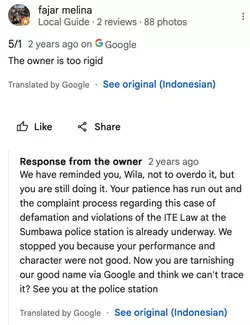That was astounding. He should be given professorship and turn it into an entire university course so we can formally understand the situation, the threat, the problems and all solutions inside and out. Seems he posts similar content on his
his YouTube channel, and turned that talk into
this podcast episode and blog post.
His talk completely explained how an Indian friend of mine ended up regressing and giving up on Western emigration and values, and how removing him as a friend, stopped holding my own life back and made matters of virtue easy without all the skepticism, doubt, and naysaying.
For the Indian acquaintance's regression
--- The following is about Indonesia, which shares many similarities ---
I recently spent several weeks in Indonesia volunteering in the education sector, travelling from Bali to Lombok to Sumbawa to Sumba and back, via ferry and motorbike. Bali is majority Hindu. Lombok and Sumbawa are majority Muslim. Sumba is majority Protestant.
As well-meaning as you might have originally been, you have so many of these low quality interactions that very quickly you start to frequently lose your patience - everybody you encounter annoys you.
In Lombok and Sumbawa, there is litter everywhere because it seems nearly everyone there litters. On their ferries, litterers will litter at their own feet, even if a bin is next to them. Even young girls will litter directly infront of a bin and alongside their mother, and bystanders do nothing besides walk over the new trash as if they are blind to it, with it bouncing around with each ignorant brush of a foot. Rather than anyone cleaning anything or picking up the trash, the ferry goers will just instead bring their own mats to sit on because everything is dirty, they just put their mats atop of all the grime and litter. Seats are first-come first-serve, they use bags or relatives to claim seats, which results in about half of the seats being unoccupied yet claimed, despite half of the people now relegated to sitting or laying on the dirty floor for 5+ hours due to these specious claims. Scammers will scam even other Indonesians, even without anonymity, for what seems like impunity. Queues do not represent an order of people waiting, but of people yet to get there first; people will push in and do not care at all about fairness, even when confronted, no change occurs. If there is a technical fault at one line's counter, the people stuck in that particular line will have to wait hours while the other equivalent counters only serve their own lines rather than assisting those stuck in the non-moving line, while people pushing into moving lines get served in minutes. Cars are always served first, even if serving motorbikes at a particular time would have been far quicker for far more people, even if the staff who are waiting for a car to serve are idle. Bad reviews on google maps from customers will occasionally say how the particular business must be bad muslims. Responses to bad reviews from the businesses will occasionally include threats of police arrests for perceived slander. This parallels when you try and educate someone who has made a mishap, they look at you like you are the person in the wrong for disturbing their firmament. Two weeks in and I felt fight-or-flight at all the civic violations.


You should do your part by demanding standards of behavior everywhere you go.
Expecting and communicating people to be better in these situations necessitates combat, as unless a critical mass is met, or you have some sort of authority over them - probably some gain in sex or money, as cited in the talk - they view you as inconvenience, seeing you being in the wrong for disturbing their own tranquility of their own firmament.
It's not just a matter of leadership either, it just seems many have yet to connect universal preferential behaviour with their self-interest, let alone connecting universal preferential behaviour to the intellectual/spiritual self-interest of their souls. Maybe it can be taught, but I'm not sure yet how it can to adults in momentary matters; which is probably why the talk cites bribes being ever-flowing in India.
Talking with university graduates in Indonesia, I was surprised that they were not informed that they can read books to unlock the skills they need to solve the problems that they see in the world. They stated that it is the lack of guidance from people who are more successful that has been what is holding them back... without them knowing that they could read books from successful people telling them how the successful people did it. Perhaps this is a reflection that all guidance that they are familiar with is that of nepotistic guidance, rather than of skill guidance. That they progress in life, by who they know, rather than by what they do.
It was such relief spending time in Sumba, where the majority Protestant population does the right thing purely because it is the right thing to do, and where they earnestly look out for others, with no foreseen benefit besides the warm fuzzies of embodying universal preferential behaviour. In extremely remote areas, there were still no markups on the petrol. On their ferries, everyone made sure everyone had a seat, and they put their trash in the bins*. If someone was scammed by someone in Sumbawa, they collectively did what they could to resolve a situation that wasn't even their own doing.
(*There was still rubbish everywhere throughout Sumba, even though I never saw littering occur there; there was even rubbish in the yards of some schools, however Indonesia has no widespread waste disposal... everything ends up burned or degraded into nanoplastics, so I'm not yet sure what any individual can do.)
Discussing potential civic improvements with Indonesian police officers, they said that everything comes from someone higher up, and changes can never come from someone lower down. Apparently there is no grassroot change within their government, as it violates their authority system. Yet the authorities live such different lives. So change only occurs when independents can sufficiently influence the appropriate rank of authority. Perhaps this is why the Indonesian populace are practically libertarian in otherwise governmental matters. Perhaps it reflects
Ikiru (1952).
During the finale of my trip, upon queueing for my flight back to Australia, the Australians immediately self-policed the chaotic disordered queue at the gate back into an order of fairness, it took a matter of seconds and the entire queue was ordered and fair. I had just come from weeks of spending hours dealing with queues in Lombok and Sumbawa where people push in. I had never been so proud of Australia as I was in that moment waiting in that line for my flight.






